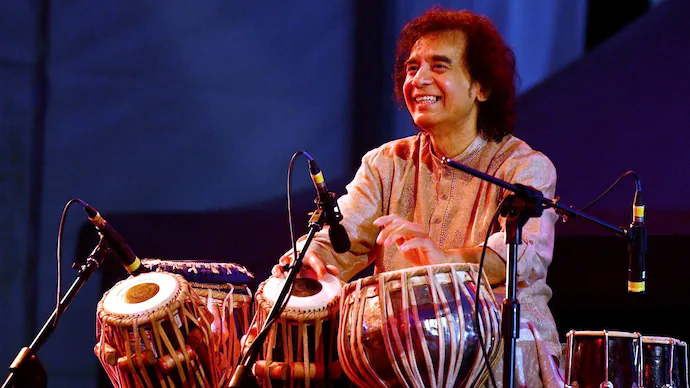A Tribute to Ustad Zakir Hussain

Amit Pandey
Ustad Zakir Hussain is a globally celebrated virtuoso of the tabla, known not only for his technical brilliance but also for his ability to transcend cultural and musical boundaries. Born on March 9, 1951, in Mumbai, India, Zakir Hussain is the son of Ustad Alla Rakha, another legendary tabla maestro. Steeped in the traditions of Indian classical music from an early age, Zakir Hussain has evolved into one of the most influential and versatile percussionists of our time. His contributions to music go beyond performance; he has become a cultural ambassador for Indian music on the global stage.
From a young age, Zakir Hussain demonstrated an extraordinary affinity for rhythm. His training under the guidance of his father and guru, Ustad Alla Rakha, instilled in him not only technical mastery but also an appreciation for the nuanced intricacies of the tabla. By the time he was seven years old, Zakir was already performing alongside his father, showcasing prodigious talent that hinted at the greatness to come. His rigorous training encompassed traditional compositions of the Punjab gharana, which he mastered while cultivating his own innovative style.
Zakir Hussain’s career spans decades and crosses numerous musical genres. As a tabla soloist, he has mesmerized audiences with his intricate improvisations and unparalleled command of rhythm. His collaborations with eminent Indian classical musicians such as sitar maestro Pandit Ravi Shankar and violinist Dr. L. Subramaniam have further cemented his legacy within the realm of Indian classical music. Yet, Zakir’s artistry extends beyond tradition. He has embraced fusion and world music, pioneering collaborations that have introduced the tabla to entirely new audiences.
A cornerstone of Zakir Hussain’s global acclaim is his involvement in cross-cultural musical projects. In the 1970s, he co-founded the band Shakti with British guitarist John McLaughlin and violinist L. Shankar. This groundbreaking ensemble blended Indian classical music with jazz, creating a sound that was both innovative and timeless. Shakti’s work was a precursor to the burgeoning world music movement, and Zakir’s contributions helped redefine how audiences perceive Indian classical instruments in a contemporary context.
In addition to Shakti, Zakir Hussain has worked with an array of internationally renowned artists, including George Harrison of The Beatles, Béla Fleck, and Mickey Hart of the Grateful Dead. These collaborations have allowed him to bridge the gap between Eastern and Western musical traditions, earning him accolades as a global musical icon. He has composed and performed for films and stage productions, further showcasing his versatility and creative genius.
Among his many accolades, Zakir Hussain has received the Padma Shri and Padma Bhushan, two of India’s highest civilian honors, for his contributions to Indian music. He has also won a Grammy Award and multiple other international honors for his collaborative works. Despite his global fame, Zakir Hussain remains deeply rooted in the traditions of Indian classical music, tirelessly working to preserve and promote its rich heritage.
Zakir Hussain’s legacy is one of innovation, dedication, and cultural integration. Through his extraordinary talent and relentless passion, he has brought the tabla to the forefront of global music, inspiring generations of musicians and audiences alike. His journey exemplifies the unifying power of music, transcending boundaries and creating a harmonious dialogue between diverse cultures.
Zakir Hussain was born on March 9, 1951, in Mumbai, India. As the son of Ustad Alla Rakha, a revered tabla virtuoso, Zakir Hussain was introduced to the world of music at a very young age. His upbringing in a musically rich environment laid the foundation for his future as a tabla maestro. Under the strict and loving guidance of his father, young Zakir embarked on a rigorous training regimen that would shape his musical destiny.
His early life was marked by an intense dedication to mastering the tabla. Ustad Alla Rakha instilled in him the importance of discipline, practice, and a deep understanding of the rhythmic complexities of Indian classical music. By the age of seven, Zakir Hussain was already performing on stage, captivating audiences with his prodigious talent and earning a reputation as a musical prodigy.
The 1970s marked a significant turning point in Zakir Hussain’s career. Seeking to explore new musical horizons, he moved to the United States and began collaborating with musicians from diverse genres. His partnership with sitar maestro Pandit Ravi Shankar opened doors to the international music scene. Together, they performed at iconic venues and festivals, introducing Western audiences to the intricate rhythms and melodies of Indian classical music.
Zakir Hussain’s versatility and willingness to experiment set him apart from his contemporaries. His collaboration with jazz guitarist John McLaughlin led to the formation of the pioneering band Shakti. This ensemble blended the complexity of Indian rhythms with the improvisational spirit of jazz, creating a unique fusion that resonated with audiences worldwide. Shakti’s music transcended cultural boundaries, celebrating the unity and diversity of global musical traditions.

Ambassador of ‘ Hindustani ’ Classical Music
As an ambassador of Indian classical music, Zakir Hussain’s influence extended far beyond concert halls. His dedication to preserving and promoting the rich heritage of Indian classical music earned him numerous accolades, including four Grammy Awards and India’s highest civilian honors: the Padma Shri (1988), Padma Bhushan (2002), and Padma Vibhushan (2023). His performances at prestigious events like the Nobel Peace Prize Concert and the opening ceremony of the Olympic Games showcased his ability to connect with diverse audiences and spread the joy of music.
Zakir Hussain’s innovative spirit was a driving force behind his success. He was never content to rest on his laurels or confine himself to traditional boundaries. Instead, he ventured into uncharted territories, collaborating with musicians from various genres and cultures. His work with Western classical musicians such as Yo-Yo Ma, and Béla Fleck, highlighted his ability to blend different musical traditions seamlessly.
One of his notable collaborations was with the Silk Road Ensemble, founded by cellist Yo-Yo Ma. This project aimed to explore the musical heritage of the historical Silk Road, bringing together musicians from diverse backgrounds. Zakir Hussain’s contributions to this ensemble added a unique rhythmic dimension, enriching the ensemble’s performances and recordings.
Beyond his performances, Zakir Hussain made significant contributions to music education. He founded the Ustad Alla Rakha Institute of Music in Mumbai, a center dedicated to preserving and teaching the art of tabla playing. His commitment to nurturing young talent ensured that the next generation of musicians continued to uphold and innovate within the traditions of Indian classical music. Through workshops, masterclasses, and personal mentorship, he inspired countless students to pursue excellence in their musical journeys.
Zakir Hussain’s approach to teaching was as dynamic and passionate as his performances. He believed in imparting not just technical skills but also a deep appreciation for the emotional and spiritual aspects of music. His students often spoke of his ability to convey complex rhythmic concepts with clarity and enthusiasm, making learning an engaging and transformative experience.
Zakir Hussain’s impact extended beyond music to the broader cultural sphere. His performances at prestigious events, such as the Nobel Peace Prize Concert and the opening ceremony of the Olympic Games, showcased Indian classical music on the world stage. His efforts to promote cultural understanding and unity through music made him a beloved figure across the globe.
His collaborations with artists from different musical traditions created a unique blend of styles that enriched both genres. These collaborations not only showcased the versatility of Indian classical music but also highlighted the universal language of rhythm and melody. Zakir Hussain’s ability to transcend cultural boundaries and connect with audiences on a profound level made him a true global ambassador of Indian classical music.
Despite his global fame, Zakir Hussain remained deeply grounded and approachable. Known for his humility and warmth, he was a beloved figure both on and off the stage. His ability to connect with people from all walks of life endeared him to fans and colleagues alike. He often spoke of his deep respect and gratitude for his parents, mentors, and the rich musical heritage that shaped his life.
Zakir Hussain’s personal values were reflected in his approach to music and life. He believed in the power of music to heal, inspire, and bring people together. His dedication to his craft, his innovative spirit, and his commitment to education and mentorship were a testament to his belief in the transformative power of music.
Like any journey, Zakir Hussain’s path was not without its challenges. The demands of a global career, coupled with the need to constantly innovate and push the boundaries of his art, required immense dedication and resilience. Yet, Zakir Hussain faced these challenges with unwavering determination and a positive outlook.
One of his significant triumphs was his ability to seamlessly integrate traditional and contemporary elements in his music. This approach not only preserved the essence of Hindustani classical music but also made it relevant and accessible to contemporary audiences. His work with the band Shakti and other fusion projects demonstrated his ability to innovate without compromising the integrity of the classical traditions he revered.
As we celebrate the life and legacy of Ustad Zakir Hussain, it is clear that his influence will continue to resonate for generations to come. His contributions to the world of music, his dedication to education and mentorship, and his role as a cultural ambassador have left an indelible mark on the global musical landscape.
In the wake of his passing on December 15, 2024, in San Francisco, the world mourns the loss of a true musical legend. Yet, his rhythms will forever echo in the hearts of music lovers, and his legacy will continue to inspire and guide aspiring musicians. Ustad Zakir Hussain’s journey was not just a musical odyssey; it was a profound exploration of the human spirit through the language of rhythm and melody.
Ustad Zakir Hussain’s journey through the world of music is a testament to the timeless beauty of rhythm and melody. His mastery of the tabla, his innovative spirit, and his ability to connect with audiences across the globe have made him a true legend. As we remember and celebrate his life, we honor not just the extraordinary musician but also the remarkable human being who touched countless lives with his music.
Zakir Hussain’s legacy is one of passion, dedication, and a deep love for music. His influence extends far beyond his performances, shaping the lives of students, collaborators, and audiences worldwide. His journey serves as an inspiration for all who seek to explore the boundless possibilities of music and its power to unite, heal, and uplift the human spirit.
Zakir Hussain, the legendary tabla player, is renowned for his exceptional virtuosity and innovation in Indian classical music. One of the most interesting aspects of his career is his role in popularizing the tabla on the global stage.
His collaboration with various Western musicians, such as John McLaughlin and the band Shakti, introduced the rhythmic intricacies of Indian music to a broader audience. This fusion of styles not only showcased the tabla’s versatility but also fostered cross-cultural musical dialogues.
Hussain’s ability to blend traditional Indian rhythms with jazz and rock elements has left an indelible mark on both the music industry and audiences worldwide, ensuring that his contributions to music will never be forgotten. His performances and recordings continue to inspire musicians across genres, making him a pivotal figure in the world of music
(Writer is the Managing Editor of The Emerging World)


